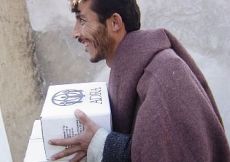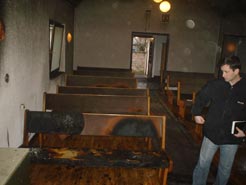In 2006, the Adventist Development and Relief Agency (ADRA) continued to fulfil its commitment to improve food security and fight hunger all over the world. During fiscal year 2006, ADRA partnered with the U.S. Agency for International Development (USAID) to distribute nearly 13,000 tons of food—nearly 35 tons per day—to vulnerable populations across the globe. More than 178,000 people received essential food items such as lentils, wheat, peas, sorghum, rice, beans, cornmeal, and flour.
The USAID commodities contributed to ADRA’s ongoing core food security initiatives, including feeding programs for the critically ill, schoolchildren and orphans, food programs for women with young children and for those living with HIV and AIDS, and food-for-work programs. The following projects represent a portion of the work ADRA is doing to combat hunger around the world.

In Madagascar, ADRA is currently running a food security project in the Moramanga district that benefits 144,000 people. The project, which is valued at nearly US$18 million, is scheduled to end in September of 2009.
In Kenya, ADRA’s Life Initiative Project feeds an estimated 5,000 children. Originally developed to assist child-headed homes, the program expanded to feed the entire student body at an elementary school. Each student receives a nutritious breakfast of porridge at the start of their day, and a lunch of rice, beans, maize, yucca, and more.
Also in Kenya, ADRA provides food for persons affected by HIV or AIDS, who have become too weak to provide food for themselves. The project benefits 3,000 households in the Nyamira and Rachuonyo districts.
In Peru, ADRA is helping 13,000 impoverished families increase their farming success and incomes. Through food-for-work programs in the communities of Ayacucho, Huanuco-Pucallpa, and Cajamarca, ADRA is restoring roads, and improving irrigation systems, as well as providing seeds, fertilizers, and other agricultural products and tools to resident farmers.
Additionally, ADRA conducts long-term food security projects, including educational programs that teach farmers how to grow drought-resistant crops, and train farmers in the latest agricultural practices and innovative marketing strategies. ADRA-led health and nutrition seminars teach families the basics of good nutrition to make their resources as cost effective as possible.
“Food security addresses a person’s access to food, or their ability to grow that food,” said Rudy Monsalve, director for food security at ADRA International. “It not only targets a person’s ability to eat today, but tomorrow, the following day, and weeks, months, in advance. ADRA works to provide its beneficiaries with the skills, abilities, and confidence to feed themselves and their families for the long term,” he finished.
In Rwanda’s East province, ADRA is making a difference in 70,000 households through projects that enhance agricultural production, increase produce marketability, and improve the health and nutrition of women, children, and other vulnerable groups. Many beneficiaries are survivors of the 1994 genocide.
Approximately 30,000 farming households in the West African nation of Ghana have also seen increased agricultural production and income, as well as improved health and nutrition thanks to ADRA’s food security projects. ADRA’s interventions will improve food security in nine out of the ten regions of Ghana, helping to change the lives of an estimated 300,000 beneficiaries.
With long-term initiatives in Central and South America, ADRA has helped farmers in Bolivia and Honduras increase their agricultural productivity, as well as teach them how to market their products more effectively. In Bolivia, ADRA food security projects are helping more than 12,000 people, with more than 25,500 beneficiaries in Honduras.
In Nicaragua, ADRA is involved in reforestation projects that help enrich the quality of farmland. In addition, ADRA trains farmers in fertilization practices that lead to healthier, more productive soil, resulting in plentiful, and more nutritious fruits and vegetables. Other ADRA projects help mothers receive access to food, as well as instruct them in basic hygiene, improved nutrition, and gardening. By growing and managing kitchen gardens, families have the opportunity to complement their basic diet with a variety of fruits and vegetables. More than 20,000 people benefit from ADRA’s food security programs in Nicaragua.
“Without proper nutrition,” said Monsalve, “it doesn’t matter how many vaccinations we give or how much we teach mothers about the basics of health care, nutrition, or hygiene. Without adequate amounts of food, and a variety of foods to nourish the children of these homes, everything else we do is for nothing.”
ADRA is present in 125 countries, providing community development and emergency management without regard to political or religious association, age, gender, or ethnicity.



